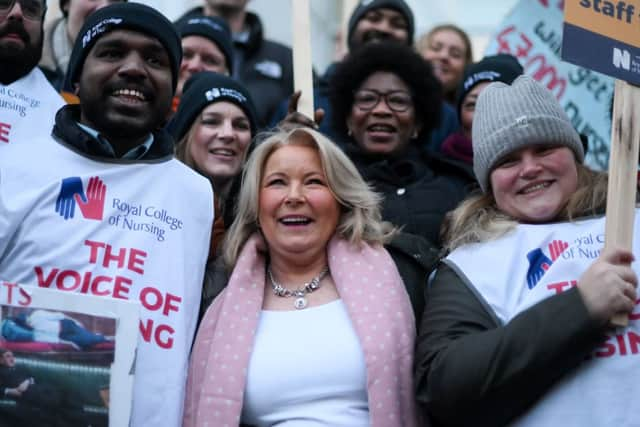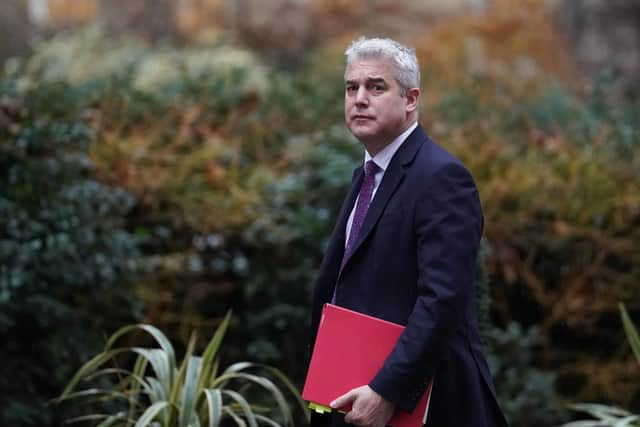Are nurses on strike in March? What has RCN said about latest strike dates and talks with government
and live on Freeview channel 276
Nurses have agreed to pause major strike action next month as they begin “intensive talks” with the government to try and settle the bitter dispute over pay.
Emergency departments, intensive care units and cancer care services were all set to be affected in a 48-hour strike on 1 March, which the Royal College of Nursing announced last week. However the union today, 21 February, said it was pausing the industrial action to focus on settling the dispute.
Advertisement
Hide AdAdvertisement
Hide AdThe RCN and the government issued a joint statement saying that the talks would focus on “pay, terms and conditions, and productivity enhancing reforms”. Health Secretary Steve Barclay is due to meet with union representatives on Wednesday.
Nurses walked out for the first time in history last year, and also took part in the biggest NHS strike in history earlier this month. Industrial action is spreading across the health sector, with junior doctors voting in favour of strike action yesterday.
However Sir Julian Hartley, chief executive at NHS Providers, said “trust leaders will be breathing a sigh of relief” that the nurses strike has been put on hold. He added: “The past weeks have seen a worrying escalation of industrial action, which has hit patients hard.”


What has the RCN and the government said?
A joint statement from the Department of Health and Social Care (DHSC) and the RCN said: “The government and Royal College of Nursing have agreed to enter a process of intensive talks.
Advertisement
Hide AdAdvertisement
Hide Ad“Both sides are committed to finding a fair and reasonable settlement that recognises the vital role that nurses and nursing play in the National Health Service and the wider economic pressures facing the United Kingdom and the Prime Minister’s priority to halve inflation.
“The talks will focus on pay, terms and conditions, and productivity enhancing reforms. The Health Secretary will meet with the Royal College of Nursing on Wednesday to begin talks. The Royal College of Nursing will pause strike action during these talks.”


‘Trust leaders will be breathing a sigh of relief’
Commenting on the news, Danny Mortimer, chief executive of NHS Employers – which represents National Health Service employers in England, said: “It is a positive development that there will be substantive negotiations with the RCN. NHS Employers will do everything in our power to support a constructive outcome to the talks with the RCN, as well as with other trade unions.”
Sir Julian Hartley, chief executive at NHS Providers, said: “Trust leaders will be breathing a sigh of relief that the Government and the RCN are finally coming round the table to talk about pay, and that the imminent nurses strikes are now on hold. The past weeks have seen a worrying escalation of industrial action, which has hit patients hard.
Advertisement
Hide AdAdvertisement
Hide Ad“Both sides being committed to finding a fair and reasonable settlement is the glimmer of hope we all needed. For these talks to end in a resolution, any agreed settlement will need to pass a vote by RCN members. Hopefully, it can pave the way for similar negotiations with other unions planning strikes.
“We eagerly await the outcome and hope that further disruption to services can be averted, allowing NHS staff to continue delivering high-quality care, bearing down on backlogs and meeting elective targets.”
The historic disruption so far
To date the RCN has held strike action over a total of six days since 15 December, when the union held its first ever strike, saying the government turned down its offer of formal negotiations. The RCN is calling for a pay rise of 5% above inflation, which would equate to 18.4% as of January. The government has so far awarded at least £1,400 for all NHS employees in England for 2022-23, with lower earners receiving up to a 9.3% rise.
Speaking to ITV News in November last year, Prime Minister Rishi Sunak said that the nurses’ union pay demands - then 17% - were “unaffordable”, adding: “Ultimately, this money is coming from taxpayers, from everybody watching, and everyone watching will also know that they’re suffering rising bills, they’ll be having those conversations with their own employers about what’s affordable in these difficult circumstances.”
Advertisement
Hide AdAdvertisement
Hide AdPat Cullen, general secretary of the RCN, has criticised the government’s stance. Speaking on the Times’ Past Imperfect podcast in January, she said: “Now, I could sit here all day and tell you nurses’ pay has dropped by 20% over the last decade. Do I believe those nurses are entitled? Absolutely, I believe they’re entitled to 19%.” Cullen added she would like Sunak and health secretary Steve Barclay to “meet me halfway” on the union’s demands.
A pay rise of 3.5% would be “affordable” for doctors and dentists next year, the DHSC said on 21 February. In its submission to the Doctors’ and Dentists’ Remuneration Body (DDRB) for the pay round 2023/24, the department said: “Through the current financial settlement provided by HM Treasury to the department and reprioritisation decisions, funding is available for pay awards up to 3.5% for the relevant staff groups within DDRB remit this year.
“Pay awards above this level would require trade-offs for public service delivery or further government borrowing at a time when headroom against fiscal rules is historically low and sustainable public finances are vital in the fight against inflation.”
Comment Guidelines
National World encourages reader discussion on our stories. User feedback, insights and back-and-forth exchanges add a rich layer of context to reporting. Please review our Community Guidelines before commenting.
